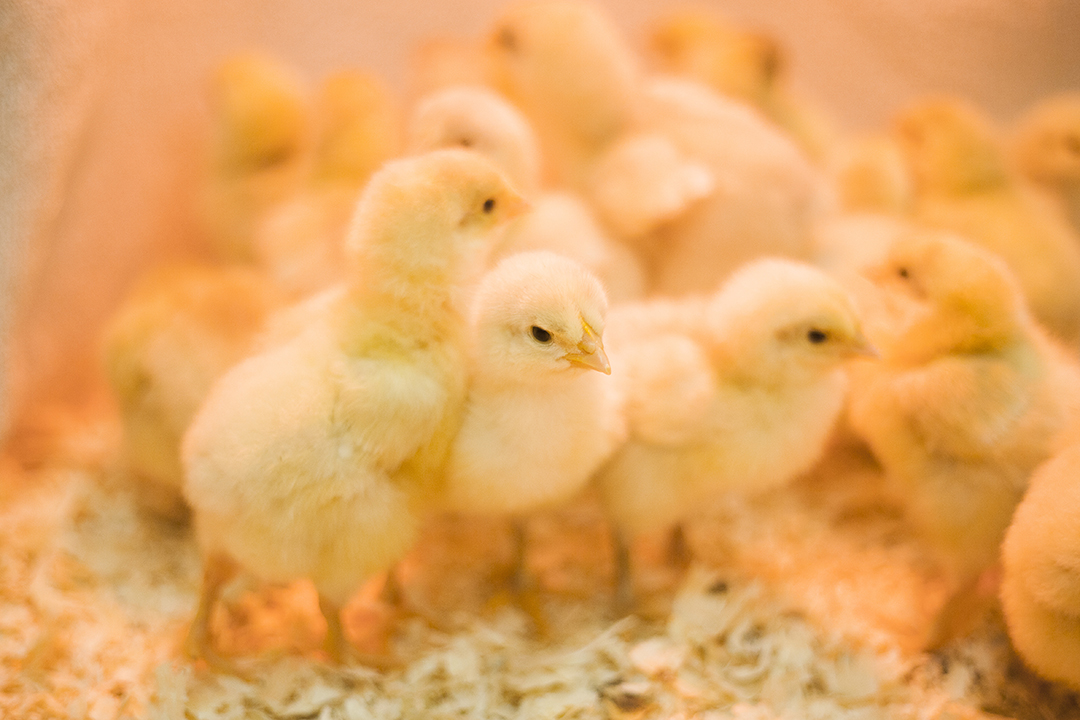
WCVM scientists develop vaccine for lethal poultry virus
Researchers at the Western College of Veterinary Medicine (WCVM) have developed a vaccine that can prevent inclusion body hepatitis (IBH), a particularly lethal virus that affects the poultry industry by causing sudden death to young broilers — chickens that are bred and raised for meat production.
By Lynne GunvilleOver the past few years, IBH has caused huge economic losses to poultry producers in Canada and around the world. Although chickens can contract IBH by horizontal transmission, meaning they’re exposed to the virus in their environment, the disease is most virulent when passed on by infected parents to their progeny.
“We call that vertical transmission,” says Dr. Susantha Gomis, a professor and head of the WCVM’s Department of Veterinary Pathology. “When the parents, called broiler breeders, are in production laying eggs and are exposed to the virus for the first time, it passes in the egg to their progeny. Then when these broilers are around two to three weeks of age, the virus gets activated and the birds are dead within hours.”
Gomis adds that the disease is particularly frustrating to producers because a broiler chick can be perfectly healthy until the IBH virus has been activated, and then there is no treatment that can stop it from attacking the liver and causing sudden death. Losses can range from five to 20 per cent of a flock – some producers have lost hundreds of chicks in one day.
With funding from Chicken Farmers of Saskatchewan, the Government of Saskatchewan’s Agriculture Development Fund, Agriculture and Agri-Food Canada’s Growing Forward 2 program, and the Natural Sciences and Engineering Research Council of Canada (NSERC), WCVM researchers set out to develop a vaccine aimed at immunizing the parents or breeders. In addition to Gomis, the research team included Shelly Popowich and Ashish Gupta.
“The virus is coming from the breeders because they’re naïve, that means they don’t have any antibodies,” Gomis explains. “So we need to immunize the parents, and if they have antibodies, they will not pass the virus to the progeny.”
Over several years of research, the scientists developed both inactivated and live vaccines for preventing IBH. Although both are equally effective, the live vaccine is cheaper to produce and easier to apply, making it more economical for poultry producers. Once the vaccine becomes commercially available, it can be added to the flock’s drinking water and become a seamless part of the producers’ regular vaccination program.
The vaccination program is key to the commercial poultry industry which relies on poultry veterinarians to schedule vaccinations for each flock. A typical program includes several vaccines that are administered to the broiler breeders. These vaccines cause them to produce maternal antibodies that are then passed on to their chicks, providing them with protection until they’re about three weeks old.
Once the IBH vaccine is added to the poultry producers’ family of vaccinations, the broiler chicks will be protected not only from vertical transmission of the IBH virus but also from horizontal transmission should they be exposed to the virus in their environment.
“When this study came about, the industry had been really hit hard by the disease, and it caused the highest mortality in broilers,” says Gomis. “We’ve now patented the vaccine and produced it on campus, and all that’s needed now is a commercial vaccine company to sell it.”
Gomis adds that he’s working with the University of Saskatchewan’s Innovation Enterprise office to seek potential buyers for the IBH vaccine technology.
References: Popowich S, Gupta A, Chow-Lockerbie B, Ayalew L, Ambrose N, Ojkic D, Gunawardana T, Kurukulasuriya S, Willson P, Tikoo SK, Gomis S. “Broad spectrum protection of broiler chickens against inclusion body hepatitis by immunizing their broiler breeder parents with a bivalent live fowl adenovirus vaccine.” Research in Veterinary Science. Mar. 2018. 118:262-269. doi: 10.1016/j.rvsc.2018.03.003.
Gupta A, Popowich S, Ojkic D, Kurukulasuriya S, Chow-Lockerbie B, Gunawardana T, Goonewardene K, Karunarathna R, Ayalew LE, Ahmed KA, Tikoo SK, Willson P, Gomis S. “Inactivated and live bivalent fowl adenovirus (FAdV8b + FAdV11) breeder vaccines provide broad-spectrum protection in chicks against inclusion body hepatitis (IBH)”. Vaccine. Jan. 2018. 36(5):744-750.
